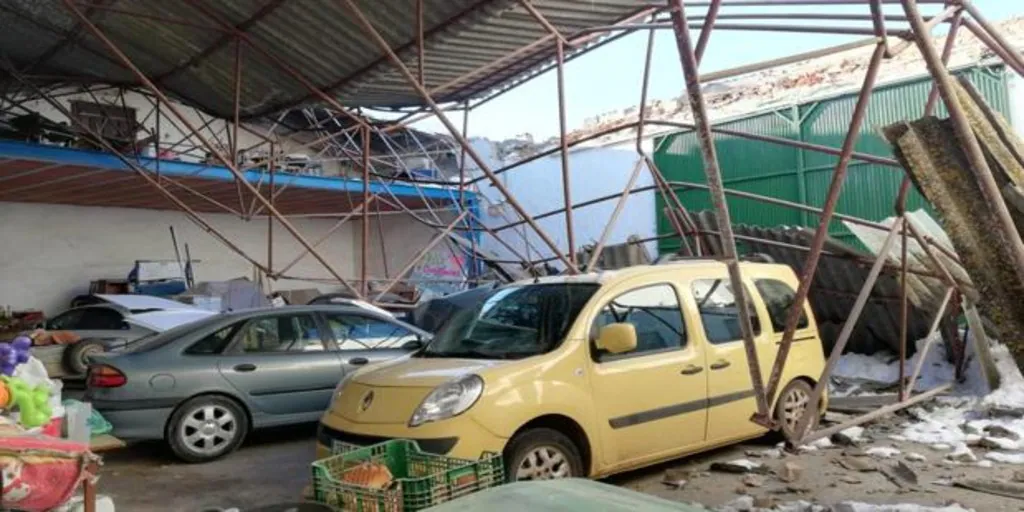Madrid
save
Filomena carpeted the Spanish countryside in white this weekend, especially in the center of the country, but it has also come to put the icing on some very difficult months for farmers and ranchers, marked by protests against low prices and the pandemic, which led to a sharp increase in demand along with restrictions on mobility.
Madrid, «ground zero»
The sixth storm of the 2020-2021 season leaves the center of the Peninsula as “ground zero”, especially the Madrid’s community. For example, in towns like Villa del Prado or Fuenlabrada, horticulture has been particularly hit. From UPA they estimate that they have been affected more than 60,000 square meters of greenhouses with a total cost of close to two million euros and crop losses of about 350,000 euros. For its part, from the majority Asaja they warn of the consequences on the olive grove of Filomena, since there is still to be collected between 35% and 40% of olive production. In particular, it is feared that the accumulation of snow will damage the olive trees. Especially the younger ones. In this sense, provinces such as Cuenca, Toledo and Ciudad Real point out.
They also point from this same agrarian organization to other crops such as early garlic or purple garlic, which could also be damaged or see its production cycle slowed down.
Valencia, in danger vegetables and some citrus
“Filomena” has also affected the agriculture of the Valencian Community, although the real effects will still take a few days to be seen, they say in the sector: from AVA-ASAJA they emphasize that the crops most affected by snow and, above all, the consequent frosts are seasonal vegetables, such as artichoke, broad beans, cabbage and lettuce. It is expected to affect some varieties of citrus, very sensitive to cold. Among the affected regions such as Camp de Túria, Camp de Morvedre, La Safor or La Ribera. In this sense, the majority agrarian organization has already issued a warning: Mercavalencia the price of products such as zucchini, artichoke or tomato have multiplied their price by two or three in recent weeks. For this reason they ask Agroseguro to accelerate its expert work and payment of the corresponding compensation.
In Murcia, it is not the snowfalls that are causing the most headaches but the frosts of these days, which on Monday Asaja warned of damage to artichoke, broad bean and zucchini production, while predicting a slowdown in the production of other vegetables such as lettuce, cauliflower and broccoli.
Almeria and Murcia
Further south in Almeria, the fears are repeated and the frosts put in check the greenhouse crops like tomatoes or zucchini. In this sense, it is expected from UPA production losses of up to 40% and prices are already experiencing increases. Furthermore, in this case and in that of Murcia It rains when it is wet, since in the first days of this year they had already been suffering frosts that would have affected 250 hectares, especially tomato and zucchini either outdoors or in the greenhouse.
From COAG they carry out an analysis similar to that of their counterparts and point to the seasonal vegetables such as the great victims of the moment, as well as citrus and olive groves. In this sense, they point to autonomous communities such as Castilla-La Mancha, Valencia, Aragón, Navarra, La Rioja, Murcia, Almería and Catalonia. In the latter, the head of olive trees at COAG Lluís Gaya, estimates that in Lleida and Tarragona between 20% and 25% of olive plantations have been affected by accumulated snow, up to 40 centimeters.
Specifically, Gaya hopes that at least the sun continues to rise in the morning despite the strong collapse of mercury because in his opinion the opposite will be a “catastrophe” as in 2001, “When many branches and olive trees had to be cut.”
Cattle raising
Regarding livestock, the main problems affect the access of the farms for the supply of feed to extensive and intensive livestockas there is no pasture available, and continue to feed the animals. Besides the fact that the snow puts it, it forces the cattlemen to double the work so that the cattle sleep warm and can use the water troughs normally.
See them
comments


